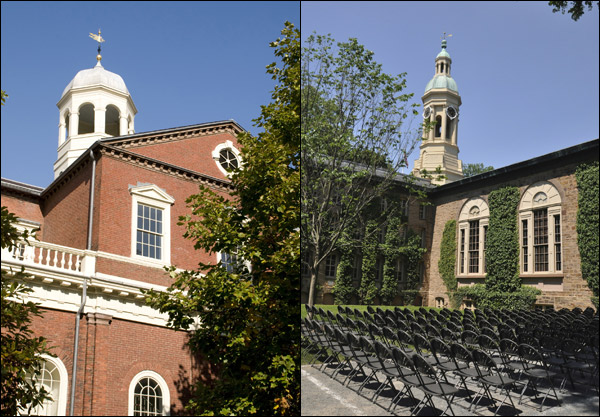2010 Muzzle Awards on campus
 |
HARVARD UNIVERSITY
Harvard, a private institution, is not bound by the First Amendment guarantee of free expression. But Harvard's own Free Speech Guidelines promise wide latitude for self-expression, because "[c]urtailment of free speech undercuts the intellectual freedom that defines our purpose." In at least four instances over the last year, however, Harvard's actions spoke louder than words.
1. Med School media muzzle A proposed Harvard Medical School policy for 2009–'10 instructed "all interactions between students and the media" to be coordinated with the school's public-relations office. The policy was reportedly influenced by student comments in a New York Timesexposé of conflicts of interest among Med School professors. When students were notified about the new policy last August, the incensed aspiring MDs naturally contacted the Times. Under the Times' spotlight, Med School administrators admitted the wording was "problematic" and vowed to remove the policy from the student handbook.
2. Law School soft censorship A third-year Harvard Law student, in a November e-mail to a friend, expressed her interest in seeing further research on a controversial question: whether race and intelligence might be genetically linked. Though the 3L stressed that she "would just like some scientific data to disprove the genetic position," she deemed the available data insufficient for certainty.
When said e-mail surfaced in late April on a self-described "legal tabloid" blog, Harvard Law Dean Martha Minow sent a school-wide response, in which she not only misinterpreted the student's intent, but condemned the mere asking of the 3L's questions. This skeptical student's "false view," Minow wrote in her accusatory e-mail, "suggested that black people are genetically inferior to white people."
Read closely, the student's e-mail makes no such suggestion. In Minow's response, however, you'll find a textbook example of soft censorship — no direct penalty, but a declaration that certain ideas (or even questions) are off-limits. Minow was "heartened" by the 3L's acknowledging "the offense and hurt that the comment engendered." How would Minow have responded had the student stood by her inquiry? Soft, or hard punishment?
3. Employee loyalty oath It's not only student speech that is under scrutiny. Harvard employees were required, this past year, to sign a stringent "confidentiality agreement," a ban on disclosure of "information about a person or an entity that, if disclosed, could . . . be damaging to financing standing, employability, reputation or other interests [emphasis added]." This serves to insulate not only Harvard, but also its administrators, from public criticism. "Other interests," of course, are in the eyes of the beholder. And few employees would risk venturing to find out what they might be.
4. The inmates take over the asylum Given the Muzzle-friendly campus milieu, it's small wonder that students even turned the cudgel of censorship onto themselves. Radical anti-immigration activist (and Minuteman Project founder) Jim Gilchrist was invited to speak at an October 17 Harvard symposium. Days before the event, notwithstanding that Gilchrist had spoken at Harvard Law less than a year prior, the Harvard Undergraduate Legal Committee rescinded the invitation. Justifying his censorial urges, a student expressed concern "about the broader national implications of legitimizing these extremist views with the Harvard name." These undergrads had clearly drunk Harvard's corporatized Kool-Aid.
YALE UNIVERSITY
Yale, too, is a private institution that, in theory, honors free expression. Yale University Press (YUP) blatantly flouted this ethos when in August it decided to censor a series of cartoons — in a book about the cartoons.
To recap: in 2005, Danish newspaper Jyllands-Posten printed cartoons satirizing the Muslim prophet Muhammad. Reactionaries protested; other papers reprinted in response; scattered violence ensued. Four years later, Brandeis University historian Jytte Klausen wrote about it: The Cartoons That Shook the World, published by YUP.
Claiming to fear a reprise of violence, YUP censored the depictions of Muhammad in this book, ironically, about censorship. John Donatich, YUP director, told the New York Times that he didn't want "blood on my hands."
The American Association of University Professors, along with 11 other free-speech advocates, issued a statement excoriating YUP, invoking Ben Franklin's warning that those who would give up essential liberty to purchase a little temporary safety will get neither liberty nor safety. (Disclosure: one of the statement's signees was the Foundation for Individual Rights in Education, of which I'm the board chairman.) Professor Klausen viewed the betrayal with apparent irony: "I became a chapter in my own book," she said at an October 1 talk.
Slate's Christopher Hitchens got closer to the heart of YUP's betrayal in response to Donatich's "blood on my hands" rationalization: "What a cause of shame that the campus of Nathan Hale [a Revolutionary War hero and Yale alum] should have pre-emptively run up the white flag and then cringingly taken the blood guilt of potential assassins and tyrants upon itself."
The foundational liberties for which patriots fought are now under siege from within. Today's enemy: modern universities' urge to "control the message" and eliminate potential threats to the bottom line.
Harvey Silverglate can be reached at has@harveysilverglate.com. Kyle Smeallie and Maria Romero, Silverglate's research assistants, contributed to this article.
No comments:
Post a Comment
Please be respectful of other people and their opinions in your comments.